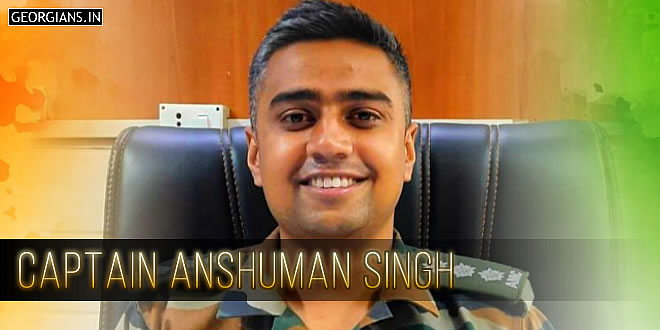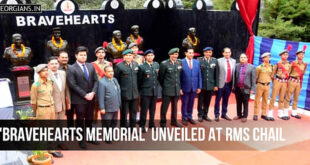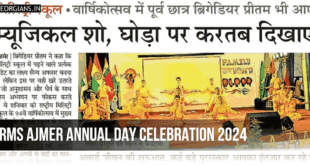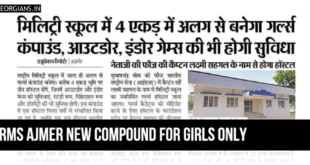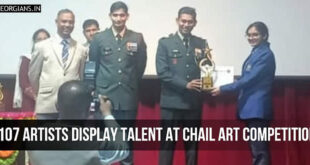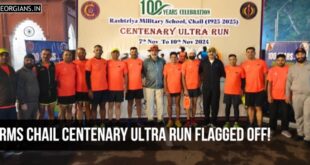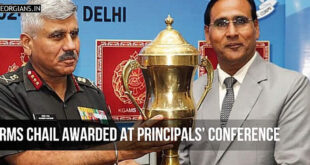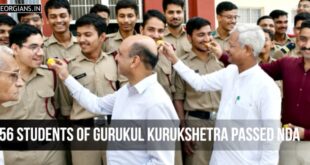Captain Anshuman Singh sacrificed his life at the Siachen Glacier saving the men entrusted to his medical care in the highest traditions of doctors that serve in the military.
Captain Anshuman Singh, 26, an army doctor posted at the Siachen Glacier, must have woken up around 2 am when fire broke out at his post last week.
The young doctor, an alumnus of the Armed Forces Medical College, Pune, was on his first field posting. On hearing the cries of help, he moved to extricate soldiers from their prefabricated dwelling huts amid the flames and smoke.
It must have been a superhuman effort by the doctor because at those heights of 18,000 feet and above, even putting one step in front of the other requires tremendous energy. Bending down to tie shoe laces takes a laborious 2-odd minutes at that altitude.
Captain Anshuman Singh: A Chail Georgian – Army Doctor
Captain Anshuman was able to rescue several fellow soldiers, but tragically, the good doctor died in the line of duty.
He sacrificed his life saving the men who were entrusted to his medical care in the highest traditions of doctors that serve in the military.
A native of Uttar Pradesh, the officer studied at the Rashtriya Military School in Chail, Himachal Pradesh. The son of a retired subedar major, he began his tenure in Siachen in June. Soldiers serve for a minimum of three months at the glacier.
The young captain was married just five months ago. The tears and loss that men in uniform leave behind is so enormous that it crushes the hearts of even those who do not know them.
Captain Anshuman’s mortal remains reached his native place after two days because bad weather prevented the military helicopter to land at the post. He was laid to rest with full military honours in the presence of his shattered family and grief-stricken well-wishers.
Three other soldiers were evacuated to the military hospital in Chandigarh with second degree burns. One fervently hopes that they recover soon and are fit enough to resume their duties.
Captain Anshuman graduated from AFMC, Pune, and went on to Agra for a year’s internship which was extended because of the Covid-19 pandemic. AFMC is the first such institute in Asia started by the armed forces that provides training in military medicine, high altitude medicine and injuries incurred in warfare.
Indian military doctors keep the armed forces ‘fighting fit’ and have played a stellar role in war and peace. They have served in the frontlines against tremendous odds and have earned the trust of the men.
A doctor or Regimental Medical Officer is part of every post at the Siachen Glacier, the world’s highest battlefield where India and Pakistan are positioned since 1984. As India occupies the heights and the passes, the Indian Army is at an advantageous combat position compared to Pakistan.
A post at the Siachen Glacier usually comprises of an officer from the combat arms — Infantry, Armoured, Mechanised etc — one doctor and soldiers.
The temperature dips to minus 40-50 Centigrade. The wind chill further reduces the perceived temperature felt by the body.
There is no land, no tree, no soil, only snow and icy winds.
Prefabricated huts serve as offices and accommodation for officers and men. A similar hut serves as a medical examination room; often the doctor also lives there.
Every day and night, the doctor meets the men and checks on their health. Since the number of troops is not large at a post, everyone knows everyone.
The most common medical issues in Siachen are frost bites and chilblains followed by high altitude pulmonary odema, high altitude cerebral odema and deep vein thrombosis.
The tips of the nose and earlobes are most prone to frost bites and soldiers wear snow goggles, gloves and specialised high altitude clothing to protect themselves.
If one were to touch a piece of metal with bare hands, the skin gets stuck to the metal. Soldiers go without shaving or use plastic razors. A gun can only be held with gloved fingers.
Any exposed part of the body for as less as 1-2 minutes results in frost bites, and soldiers risk losing fingers and toes.
Lack of appetite and anxiety are other factors that afflict soldiers posted at heights that are not fit for human habitation.
The medical examination room at the post would typically be provided with stretchers, oxygen, first aid, medicines, injections etc, and those needing further treatment are transported by helicopter to the base hospital in Siachen.
If the weather is clear, a chopper arrives pronto, but if the weather is bad, the patient has to wait till the weather clears up.
At that altitude water does not boil at 100 degrees and has to be placed inside a pressure cooker for it to boil.
“Morphine vials used to get frozen and had to be thawed in hot water before administering them,” remembers a doctor who had served there in the 1990s.
Over the years, the facilities have improved tremendously for soldiers serving at Siachen, including medical services.
The base hospital in Siachen includes equipment like digital radiography, an oxygen plant and a Hyperbaric Oxygen Therapy Chamber to treat those suffering with high altitude cerebral and pulmonary odema.
The patient is placed inside the chamber containing pure oxygen in air pressure levels 1.5-3 times higher than the average atmospheric pressure. The aim is to fill the blood with enough oxygen to repair tissues and restore normal body function.
It is by sheer courage and dint of human will that soldiers survive and do their duties on the glacier. Even though they have the best of high altitude clothing, better quality of meals, access to satellite/cell phones and other facilities compared to the past, soldiers live from day to day in the harsh, inhospitable terrain, unfit for humans.
Here it is not the bullets that kill, but the weather does.
When fire broke out at the post, Captain Anshuman did what an officer of the Indian armed forces is trained to do — he led from the front.
He did not let his men down; serving them till the last breath left his body.
 Georgians Rashtriya Military Schools
Georgians Rashtriya Military Schools
